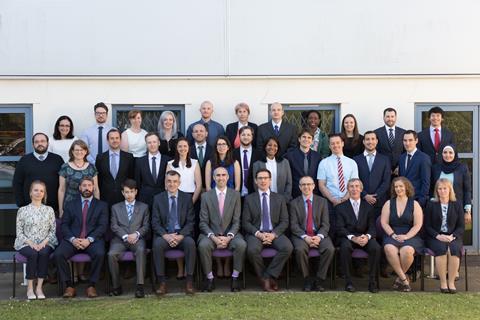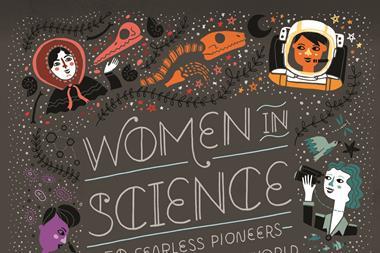Much progress must be made before we reach gender equality within Stem. Four employees from process chemistry company CatSci discuss what it means to be a woman working in Stem (science, technology, engineering and maths) in the 21st century




There has been much discussion about gender bias and disparity within Stem-focused workplaces recently, and with good reason. Gender-based barriers that impact progression, retention and even the choice to study Stem subjects are still in place. Whether the working environment is a lab, lecture theatre or boardroom, there will generally be fewer women than men working there.
Figures show that women make up just 28% of those working in Stem industries in the US, with the number being slightly lower at 25% in the UK. What’s more, gender inequality is of particular concern in the field of chemistry. A Royal Society of Chemistry survey revealed 74% of respondents have witnessed the lack of progression and retention of women in the workplace.
With its near 50/50 gender split, CatSci is a uniquely diverse company within the chemistry industry
We can take heart in the massive inroads being made towards equality. Think tanks, specialised grassroots charity movements and social media influencers are leading the drive for change. Importantly, companies working within Stem industries are also helping to transform the gender landscape from the bottom up by fostering inclusive and empowering workplace cultures.
One of these companies is CatSci, an award-winning process R&D contract research organisation supporting drug discovery and development through innovative and tailored chemistry services. With its near 50/50 gender split, CatSci is a uniquely diverse company within the chemistry industry. In this roundtable discussion, four female CatSci employees share their insights on gender bias and provide their perspectives on what it means to be women working in chemistry.
As we work quite far down the drug development pipeline, the real-life impact of our work is tangible
Jo Sampson
Could you give us a quick overview of your roles at CatSci?
Sampson: I work as a senior scientist, designing and conducting experiments to optimise a chemical reaction or process. The job of a process chemist is intellectually stimulating due to the need to understand reactions and develop efficient processes that are suitable for the plant. Working in process chemistry deepens our chemistry knowledge and, as we are working quite far down the drug development pipeline, the real-life impact of our work is tangible.
Rochette: With process chemistry, you are closer to the patient and final drug compound, which gives a real purpose to the job. At CatSci, I am a senior scientist and my particular focus is on process development. I always knew I wanted to work in industry rather than academia, and I made the switch after my postdoctoral studies.
I love the fact that I have a good knowledge of chemistry when marketing the company. It helps me understand CatSci’s capabilities
Sofia Papadouli
Wallis: I am CatSci’s business development manager. I worked in the lab doing organic synthesis all the way through my EngD and only started working in business development afterwards. I fell into it by accident, but it’s the best thing I’ve ever done. I attended a conference with the business development representative of the company sponsoring my EngD, which gave me amazing insight. It was incredible to meet so many new people and see how to get a product to market. I loved it!
Papadouli: My role at CatSci is marketing manager and it was the same for me. My marketing career came as a total accident. I was working as a postdoctoral scientist when the opportunity came to switch to a commercial function within CatSci. I love the fact that I have a good knowledge of chemistry when marketing the company. It helps me understand CatSci’s capabilities and the company’s aims too.
Jo and Elise, was there anything that made you want to work specifically in a lab?
Rochette: Chemistry is great because it’s intellectually challenging but it also has manual elements, so it’s a great balance.
Sampson: I agree with Elise. Another thing I really enjoy about the work is the comradery - which I’m sure you have in other roles too! When we are gathered round a fume hood brainstorming how to improve a reaction - that’s a level of teamwork I enjoy.

How does CatSci create a supportive environment for its female employees?
Papadouli: The CatSci environment is unique because the company is so diverse and I feel I have the same opportunities as my male colleagues. There’s no room for discrimination and if a problem arises, the company will take it seriously.
Rochette: I don’t feel like I’m treated differently to male colleagues, which is all I can ask for.
Wallis: Right from the start, CatSci was great. It was fantastic to see how friendly everyone was during the interview process and to see the near 50/50 gender split.
A man told me I couldn’t possibly go to the US and speak to important reps because I was too little and cute
Jenny Wallis
Looking at the industry as a whole, do you think women are perceived differently to men?
Wallis: I have an example that could be considered gender bias. In my previous company, I was discussing roles and responsibilities with a potential client at an event. I said I often visited America to search for new business and a man told me I couldn’t possibly go there and speak to important reps because I was too little and cute! Whether he meant it as a joke or not - it shocked me. It made me more determined to achieve my goals and continue in my role.
Papadouli: I think the traditional perception of women being less good at Stem can lead to an unconscious bias in the working environment. As an interview panellist here at CatSci, I’ve questioned potential candidates and, at times, the male ones looked to male colleagues when answering. Looking back, I find it funny but it’s not funny at all.
Wallis: I agree with that. In meetings where there are a group of men and a couple of women at the table, questions will almost always be directed at the men, regardless of their position. In meetings, attendees will direct information towards the men. It happens subconsciously, even though the CEO might be a woman.
The biggest worry is how you can balance career progression with your personal life
Elise Rochette
Do you worry that your gender might affect your career progression?
Rochette: The biggest worry is how you can balance career progression with your personal life. If you are thinking of having children, how will that impact your career? It is a concern. It might not be your focus right now, but it could be in the future and these potential decisions play on your mind.
Sampson: I agree and I think it’s great when women further ahead in their careers are honest with early career researchers. Professor Lesley Yellowlees gave a talk at my PhD graduation. Speaking specifically to the female graduates, she said there would be times when you will feel torn but it is possible to have a successful career and a family life. The Royal Society of Chemistry’s current president, Dame Carol Robinson, has also discussed her career choices. She had an eight-year career break to raise children but returned to research and has had a phenomenal career, becoming the first female professor of chemistry at both Oxford and Cambridge. These stories are really encouraging and inspiring.
Women look at a job advert and think ‘I can do seven out of 10 of the things they’re asking for. But I can’t do the last three so I won’t apply’
Jenny Wallis
How can workplace climates and progression for women be improved?
Wallis: Workshops and events at conferences about women in Stem are incredibly important. Honestly, it sounds so clichéd but you leave the sessions feeling so empowered. The strongest message I have heard at these events is that women should change their mindset – they look at a job advert and think, ‘I can do seven out of 10 of the things they’re asking for. But I can’t do the last three so I won’t apply.’ Maybe someone else would look at it and think, ‘I can do one or two – I’m going to go for it.’
Rochette: Encouraging men to take paternity leave will relieve the burden and the discrimination women feel when they start a family. It would help both genders because men should have the opportunity to take care of their child. That should not be solely the responsibility of women.
Papadouli: Improving maternity and paternity leave, and allowing more flexible working times will help to retain women in the workplace. It’s important to get feedback from women within the organisation. How do they feel about these things? With their opinions, we can identify solutions. It is also important to have policies that benefit families, such as child support – which is so expensive. We may have to work part time in order to raise our kids and have a career, so it would be good if organisations had a policy to help families with child support. Having more women in recruitment processes and in C-level positions would create more role models for aspiring women in Stem.
Previously, women would look at a job and just think that they couldn’t possibly be a C-level team member
Jenny Wallis
How can we move forward as an industry and help get women into those decision-making positions?
Wallis: It’s a confidence thing, which can be helped through better representation. The number of women starting their own companies and getting to C-level positions is increasing, which creates a positive feedback loop. Previously, women would look at a job and just think that they couldn’t possibly be a C-level team member.
Rochette: To boost confidence, I think it would also be good to have recognition of achievements throughout your career. Positive enforcement for a job well done would counter that ‘imposter feeling’. Mentorship is key – being encouraged to apply for certain jobs or promotions is so important.

What advice would you give to women starting their process chemistry careers?
Rochette : Don’t be shy and ask for help – whatever kind of help you need. Sometimes process chemistry can be quite physically demanding, and that’s just how it is. If you’re just starting out you have so much to learn, which has nothing to do with being a woman so don’t feel intimidated by this.
Sampson: Enjoy it! Relish the opportunities that come your way and enjoy the opportunity to learn from everyone else around you. In the case of CatSci – everyone is so bright! I’m enjoying learning from them and becoming a better chemist myself.
Papadouli: It’s good to find positive role models and to seek their advice. I’m sure they’ll be happy to mentor you and positively impact your career.
Seize opportunities along the way and glean as much knowledge as you can
Jo Sampson
Is there anything you wish you’d known about this industry when you first started out?
Wallis: For me it’s about opportunities and taking as many opportunities as you can. I also wish I had taken a year out in industry at undergraduate level. That would have provided me insight into what working in the lab is like. I’m not saying it’s relevant now that I’ve moved to business development but it would have given me a broader perspective at the time.
Sampson: I’ll echo that. As well as taking an industrial placement, I’d encourage undergraduates and early career researchers to attend conferences to explore different types of chemistry. Even working abroad is a good idea. All these experiences make you a well-rounded chemist and well-rounded professional. They expand your horizons personally and professionally. I agree with Jenny. If you seize opportunities along the way and glean as much knowledge as you can from these experiences, you will be more informed in your job and appreciate the field so much more.
Curious about CatSci’s advocacy around women in Stem? Head over to its Twitter account to learn about some of the fantastic women working there.
Lizzie Harrett is a content manager at Notch Communications














No comments yet